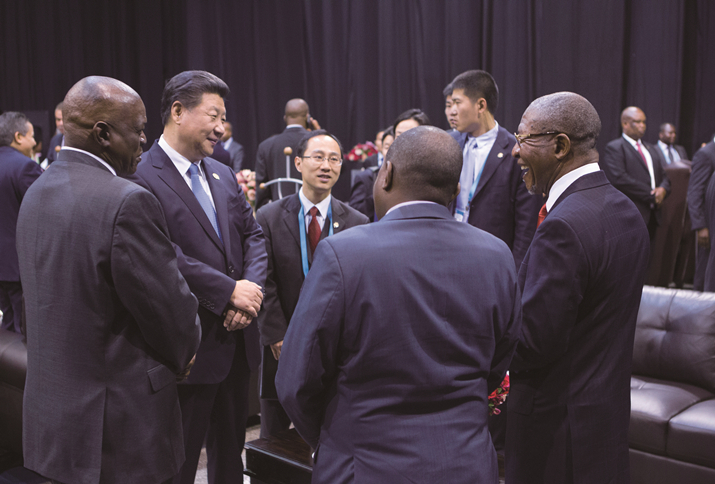|
|||||||||||
|
|
| Seize the Day |
| The FOCAC Summit in Johannesburg has created a time of opportunity for Africa |
| By Garth Shelton | VOL. 8 JANUARY 2016 |
 |
| Chinese President Xi Jinping with African leaders attending the Johannesburg Summit of FOCAC |
The last 30 years have witnessed a growing China-Africa engagement with positive outcomes for both sides. China's economy has grown significantly, while the World Bank has confirmed that China's interaction with Africa has boosted economic prosperity across the continent. Since the year 2000, the Forum on China-Africa Cooperation (FOCAC) has become an important multilateral mechanism, driving, managing and facilitating this creative and mutually beneficial China-Africa interaction. The new challenge following the conclusion of the FOCAC Summit in Johannesburg in December 2015 is for China and Africa to build a sustainable, long-term relationship which produces specific and quantifiable development benefits for both sides. The Johannesburg Declaration and three-year Action Plan offer a comprehensive agenda for broadening and strengthening political and commercial cooperation and outline a vision to advance a practical development partnership.
FOCAC is the diplomatic arena for developing Sino-African cooperation and problem solving, while providing an important framework for advancing a common development agenda. The Johannesburg Summit brought Chinese and African leaders closer to promote policy coordination and expanded commercial interaction toward common prosperity.
A new FOCAC synergy with Africa's development program, especially the African Union's Agenda 2063, is expected to be the key to championing a long-term sustainable development partnership. The evolving FOCAC process promotes an increase in the volume of inter-state transactions intended to provide new opportunities and prospects for mutual benefit. FOCAC promotes a process of mutually beneficial interdependence between China and Africa, underpinned by China's commitment to peaceful co-existence, equality and respect for sovereign independence. Africa has gained significantly from this and stands to gain further through strengthening interaction and diplomatic exchange. This regular and structured diplomatic interaction provides a mechanism to identify and develop new opportunities. The Johannesburg Summit has mapped out a future for both sides to achieve common prosperity.
 |
| A model of China’s newly unveiled airliner, the C919, is displayed at the China-Africa Equipment Manufacturing Industry Exhibition held in Johannesburg |
If Africa can create a more positive investment environment, increased Chinese investment is certain to flow to the continent, bringing new technologies, skills, capital and most importantly, jobs for Africa's youth. China's exports have brought affordable products to African households and
China's construction projects have laid the foundation for further economic development on the continent. Appropriate African policy adjustments and the promotion of a business-friendly environment will create significant opportunity for new and sustained economic growth in Africa.
In many ways, the implementation of the action plan will depend more on Africa than on China. Implementing business-friendly policies in Africa is the key to enhancing the China-Africa relationship and lifting the African continent out of poverty. China's business-friendly policies, especially in the special economic zones (SEZs), were the catalysts which ignited new industrialization and prosperity for the Chinese people. Following the China model means good planning, creating investment opportunities and leveraging advantages. New SEZs across Africa, supported by Chinese investment in export-orientated manufacturing, could be the key to job creation and rapid economic growth.
As the Chinese economy grows, increased commercial engagement with Africa will offer the continent new prospects for trade and investment. The challenge is for Africa to grasp the opportunities offered by China and take full advantage of trade, investment and assistance programs. The key to future success for Africa depends on Africa's appropriate response in addressing its own impediments to growth, such as low levels of productivity, high transaction costs, poor market access and an unfavorable investment climate. Indeed, the central challenge for Africa is to be more like China in terms of economic reform and especially in creating favorable conditions for inward investment flows.
The framework for Africa's successful development agenda would include pro-growth policies, inclusive systems of government, improved political and corporate governance, conflict resolution, and more competitive labor practices. This will open the way for new Chinese investments in manufacturing to kickstart Africa's industrialization. China has offered Africa a very favorable FOCAC program for future collaboration and cooperation. Many new possibilities can emerge from the positive relationship with China, but the future of the continent lies overwhelmingly in the hands of Africa's leadership. The FOCAC Summit in Johannesburg created a time of opportunity for Africa, and the opportunity should not be missed.
(The writer is professor of international relations at Witwatersrand University, South Africa)
|
|||
| Copyright ChinAfrica All right reserved 京ICP备08005356号 |